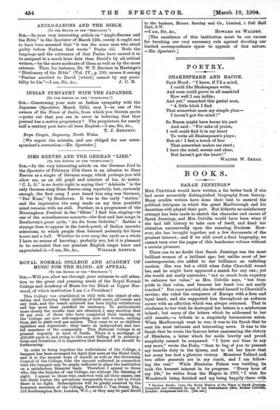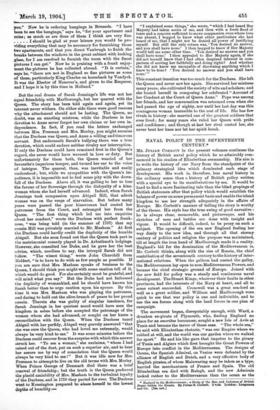BOOKS.
SARAH JENNINGS.*
MRS. COLVILLE would have written a far better book if she had more accurately distinguished biography from history. Many erudite writers have done their best to unravel the political intrigues in which the great Marlborough and his dauntless wife played their part. But hitherto no satisfactory attempt has been made to sketch the character and career of Sarah Jennings, and Mrs. Colville would have been wiser if she had left history to take care of itself, and fixed her attention unreservedly upon the amazing Duchess. How- ever, she has brought together not a few documents of the greatest interest ; and if we still await a final biography, we cannot turn over the pages of this handsome volume without a certain pleasure.
There can be no doubt that Sarah Jennings was the most brilliant woman of a brilliant age; but unlike most of her contemporaries, she added to her brilliance an unfailing caution. She was but a child when John Churchill wooed her, and he might have appeared a match for any one ; yet she would not easily surrender, "not so much from coquetry to enhance her value," as Mrs. Colville says, "but from pride in that value, and because her heart was not easily touched." But once married, she devoted herself to Churchill's service ; she ruled the conqueror of Europe with a firm and loyal hand; and she supported him throughout an arduous. career with an affection which was always returned. That in obedience to her wish be destroyed her letters is a misfortune indeed ; but many of the letters which he addressed to her still remain,—a tribute to a singularly harmonious union. When Marlborough went to war, it was to his Sarah that he sent his most intimate and interesting news. It was to his Sarah that he wrote the famous letter announcing the victory of Blenheim, a letter which for noble brevity and proud simplicity cannot be surpassed. "I have not time to say any more," wrote the Duke, "than to beg of you to present my humble duty to the Queen, and to let her know that her army has had a glorious victory. Monsieur Tallard and, two other generals are in my coach, and I am follow- ing the rest." While Blenheim Palace was building, he took the keenest interest in its progress. "Every hour of my life," he writes from the Hague in 1707, "I wish for Woodstock being finished and my being happily there with • Duchess Sarah : being the Social History of the Times of Sarah 'remain's. Compiled and arranged by one of her Deecendente (Kra. Arthur Colville). London; Longraans and Co. [18e. net.]
you." Now he is ordering hangings in Brussels. "I have been to see the hangings," says he, "for your apartment and mine ; as much as are done of them I think are very fine.
I should be glad at your leisure you would be pro- viding everything that may be necessary for furnishing those two apartments, and that you direct Vanbrugh to finish the breaks between the windows in the great cabinet with looking glass, for I am resolved to furnish the room with the finest pictures I can get." Now he is praising with a frank enjoy- ment the pictures he has collected abroad. "It is certain," says he, "there are not in England so fine pictures as some of these, particularly King Charles on horseback by Vandyck. It was the Elector of Hanover's, and given to the Emperor, and I hope it is by this time in Holland."
But the real drama of Sarah Jennings's life was not her equal friendship with Marlborough, but her quarrel with the Queen. The story has been told again and again, yet its interest never withers. On either side there were good reasons why the attachment should not be lasting. The Queen, no doubt, was an exacting mistress, while the Duchess in her devotion to Anne never forgot her own claims or her own in- dependence. In fact, if you read the letters exchanged between Mrs. Freeman and Mrs. Morley, you might surmise that the Duchess was Queen, and Anne a willing and timorous servant. But underneath Sarah's bullying there was a true devotion, which could endure neither rivalry nor interruption. If only the Duchess could have remained first in the Queen's regard, she never would have wavered in love or duty. But unfortunately for them both, the Queen wearied of her favourite's imperious temper, and turned her ear to the voice of intrigue. The quarrel, then, was inevitable and easily understood ; but, while we sympathise with the Queen's im- patience, it is impossible not to feel some pity with the down- fall of the Duchess. Above all, it was galling to her to lose the favour of her Sovereign through the disloyalty of a kins- woman whom she had herself advanced. Indeed, when Sarah Jennings took compassion upon Abigail Hill, that adroit woman was on the verge of starvation. But before many years were passed the poor kinswoman had ousted her patroness from the Court, and estranged her from the Queen. "The first thing which led me into enquiries about her conduct," wrote the Duchess with perfect frank. raess, "was being told (in the summer of 1707) that my cousin Hill was privately married to Mr. Masham." At first the Duchess could hardly credit the duplicity of the humble Abigail. But she soon found out that the Queen took part in the matrimonial comedy played in Dr. Arbuthnot's lodgings. However, she consulted her Duke, and he gave her the best rrdvice, which, needless to say, the intrepid Sarah did not follow. "The wisest thing," wrote John Churchill from Meldert, "is to have to do with as few people as possible. If you are sure that Mrs. Masham speaks of business to the Queen, I should think you might with some caution tell of it, which would do good. For she certainly must be grateful, and will mind what you say." But the Duke had not fathomed the duplicity of womankind, and he should have known his Sarah better than to urge caution upon his spouse. By this time it was Mrs. Masham who was playing the patroness, and daring to hold out the olive-branch of peace to her proud cousin. Therein she was guilty of singular insolence, for Sarah Jennings in her quietest mood would have seen the kingdom in ashes before she accepted the patronage of the woman whom she had advanced, or sought on her knees a reconciliation with the Queen. When the Duchess taxed Abigail with her perfidy, Abigail very gravely answered "that she was sure the Queen, who had loved me extremely, would always be very kind to me." It was some minutes before the Duchess could recover from the surprise with which this answer struck her. "To see a woman," she exclaims, "whom I had raised out of the dust, put on such a superior air, and to hear her assure me by way of consolation that the Queen would always be very kind to me !" But it was idle now for Mrs. Freeman to attempt to live on the old terms with Mrs. Morley. When Prince George of Denmark died there was a brief renewal of friendship ; but the truth is the Queen preferred the placid amiability of Mrs. Masham to the turbulent loyalty of the Duchess, and in 1710 they parted for ever. The Duchess *colt to Kensington prepared to abase herself to the lowest depths of humility:— "I explained some things," she wrote, "which I had heard Her Majesty had taken amiss of me, and then with a fresh flood of tears and a concern sufficient to move compassion even where love was absent, I begged to know what other particulars she had heard of me, that I might not be denied all power of justifying myself. But still the only return was, You desired no answer, and you shall have none.' I then begged to know if Her Majesty would tell me some other time. You desired no answer and you shall have none.' I then appealed to Her Majesty again, if she did not herself know that I had often despised interest in com- parison of serving her faithfully and doing right ? And whether she did not know me uneapable of disowning anything which I knew to be true ? You desired no answer and you shall have none.'"
This constant iteration was too much for the Duchess. She left the Queen and never saw her again. She survived her mistress many years; she cultivated the society of wits and scholars; and she busied herself in composing her celebrated "Account of her Conduct at the Court of Queen Anne." Pope was among her friends, and her conversation was esteemed even when she had passed the age of eighty, nor until her last day was this courageous woman insensible to the zest of life. She has few rivals in history : she married one of the greatest soldiers that ever lived ; for many years she ruled her Queen with pride and confidence ; and though at last her rival ousted her, she never bent her knee nor let her spirit break.











































 Previous page
Previous page